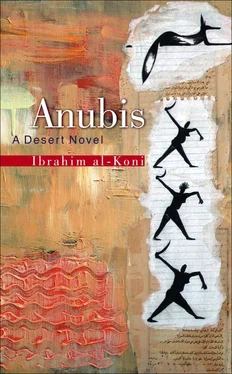I also discovered that this type of anxiety is a labyrinth more difficult to escape than to enter. Anyone who grows accustomed to it and walks partway through it necessarily finds the hidden vessels of his heart so weakened that he will never taste happiness anywhere in his world, unless it be diluted by a dose of anxiety, which is a malady that originates from an innocent question about one’s origins. As the individual falls sick, this indisposition matures into a bitter longing, which inevitably leads its victim to the refuge people call anxiety, which the lost law made a precondition for obtaining the treasure referred to as the lord.
3 When the Flocks Head Home
THE RULES GOVERNING origins seem to be no less authoritative than the law’s own rules. In other words, I began to discover that I had inherited my wanderlust from a source personified by the shadow squatting by the tent post, from the figure Ma referred to as Ba the day she taught me names. I did not get a good look at this creature, just a glimpse, and so it seemed fitting for me to think of him as a shadowy apparition. Even though he had not taught me the names, as my Ma had, had not hugged me to his chest, as my loving lady had, and had not immersed me in the floods of his compassion, as the priestess of eternity had, all the same, when I opened my eyes to observe my dawning, he definitely informed me in an insistent whisper that my secret lay concealed in his wretched specter and that unless I found a way to meet him, my path would be a desert labyrinth. For that reason, apparently, I succumbed to this insane fever that began with what the community terms the “cradle” and that has haunted each step of my progress through life. I doubt I will ever recover from it, since my thirst for my Ba has not been destroyed by time, which tends to destroy everything in our world. Instead, amazing though it may sound, this thirst has gained strength with time and evolved into a concern, a longing, and a belief. I have found that it courses through my blood, like a torrent through the ravines, until it pours into the mysterious sea that, not so long ago, I named “anxiety.”
It is hardly surprising, therefore, that the first question I asked my Ma, when I regained control of my tongue, was: “Where did I come from?”
My mother’s answer was, “Same as everyone.”
Since I was not satisfied with this response, I asked, “How does everyone come?”
She replied, “From a mother and a father.”
“You’re my mother,” I said. “Why don’t I see my father nearby?”
“Because absence is the destiny of fathers.”
“Why must fathers accept absence as their fate?”
“Because fathers, like lords, are not really fathers, unless they distance themselves.”
“But I saw him once,” I protested. “I caught a glimpse of him as a ghostly apparition. I swear!”
She explained, “He would not have been a father unless you had seen him. Like the lord, the father must be seen at least once to demonstrate that he is a father, but he must also disappear to prove he’s a father.”
I was amazed. “But why must he disappear, since he can appear?”
“We are only truly convinced by what we see but only believe in what we don’t see.”
“Why doesn’t he stay with us forever?” I asked.
“Because he comes to convey the message to us.”
I asked, “What message?”
“The message that migration is the father’s choice, since he wants to be as he ought to be.”
“What does he want to be?”
“To be worshiped, not loved.”
“Why can’t he be both loved and worshiped?” I asked in astonishment.
“Because we worship what we don’t see and only love what we do see.”
I protested, “But, my mistress, I don’t understand.”
She remained silent. Dejected, she gazed at the open countryside, which was flooded by the light of glorious Ragh. As she lifted her head toward the naked sky, her wrap fell from her hair, which was braided in thick, black plaits. She said, “We worship the sky but love only the desert. The sky is our father, whom we worship, because he is far away. We worship him, because we know nothing about him. On the other hand, wherever we turn, we find the desert before us. For this reason we love the desert, and we consider her our mother.”
I felt desperate, and in my desperation she detected anxiety. I was astonished that she showed me no compassion then, since I had learned compassion from her. She swept her gaze across the vast areas flooded by rays from the divine, rising sun and said, as if addressing her stern prophecy to the desert wastes, “Yes, indeed, we worship fathers but love mothers.”
Her prophecy about love for mothers did not astound me, but I did not understand — until I had shed blood in my quest for the missing, ghostly apparition — why concern about our fathers should change into longing or why this longing should develop into anxiety. This passion eventually exercised such a profound influence over me that I was unable to eat or sleep. Then I found no antidote save to depart.
I followed the camel trail until I reached the herdsmen in the neighboring grazing lands. I told them the truth, explaining that I had set forth in search of a father whom I had seen only as a ghostly apparition when he entered our residence as stealthily as a thief, to flee from it just as stealthily, shortly before dawn. Since the frequency of his visits had decreased as I advanced through the stages of my quest to learn the difference between truth and error, I now doubted whether I had ever heard him speak to my mother or had observed his shadowy form squat beside the tent post. How did the herdsmen reward my tale? They scoffed at me, laughed in my face, and said that I would never taste happiness, since it is a curse to search for a father in the desert. When they noted the anxiety in my eyes, the eldest approached and led me out into the open country. There he advised me to retrace my steps if I wished to enjoy peace of mind. He explained that a father is an anonymous envoy whose mission is to bring people like me to the labyrinth that generations of men have called the desert only to double back on his tracks and disappear forever. The shepherd also said that a father resorts to tricky stratagems to discourage forgetfulness and that mine had slipped an amulet named memory into my heart, so I would discover him there each time longing overwhelmed me. On detecting my misgivings from my eyes, he bowed his head for a time.
Then, casting me a melancholy glance, he said, “Beware of searching for a father in the desert. This brings nothing but calamities.” He stared at my face for a while, noting my determined and even disapproving expression, and then watched my body tremble. So he decided to yield. He spat forcefully and then said compassionately, “Fine. It’s futile to attempt to dissuade a man from something that is part of his destiny. You can follow the caravan route that heads to the southern oases, if you’re not afraid of thirst. You can attempt to waylay your father at the well of Wanzir, if you’re not afraid of trackless wastes. You can also return home to transform your longing into a song there, if you want to save yourself.” I don’t sing, however, not because I lack talent, but because I’ve never found a tune that can cure a disease. So I set off to the west to lie in wait for my father at the neighboring well of Wanzir, following the advice of the shepherds’ sage.
Hoping to reach the place shortly before sunset, I departed as the time approached for the flocks to head home. The starkness of the earth became even more depressing, severe, and gloomy, and so I turned my eyes to the sky, which was stark and severe too. In the sky’s severity, however, there is always a consolation. As the lavish floods of Ragh washed across it that afternoon, the sky became clearer, bluer, and more profound. On the next leg of the journey, the trail that the caravans’ camels had dug with their heavy padded hooves crossed an area of clay soil strewn with rocks grilled by the punishing, ever-lasting disk, and marked here and there by pathetic water courses, over which rain water had run in the rare rainy seasons. Gullies appeared only to end abruptly and disappear in the next stretch, since the short-lived rains that had carved them had evaporated or had been absorbed by the ever-thirsty earth. Then I would find myself lost in a labyrinth once more. The labyrinth is anything but stingy with the wayfarer; it flings decoys in his path to mislead him. The ancestral sepulchers rise in piles of black stones scorched by the fires of immolations. They do not reach very high; their rocks have been strewn about hither and thither and dispersed by the force of the rains and storms or by the passing days, since antiquity. From time to time, tombs of more recent vintage can be seen. They are larger, and their stones lighter.
Читать дальше












